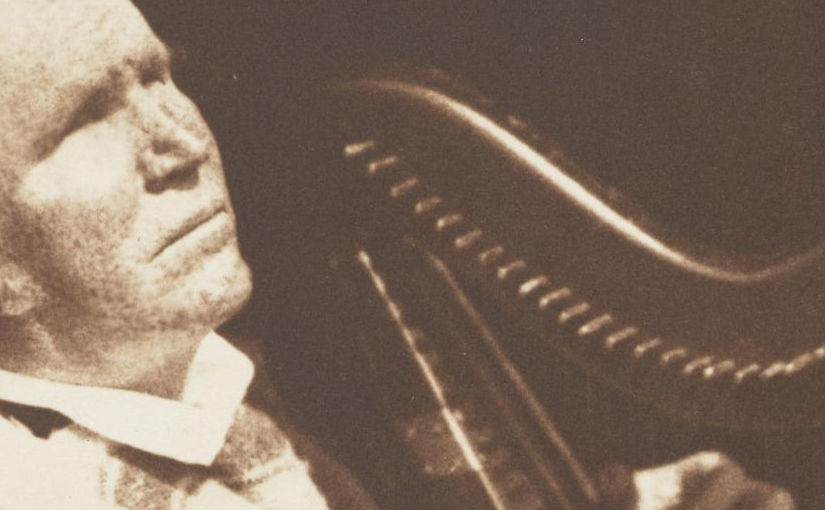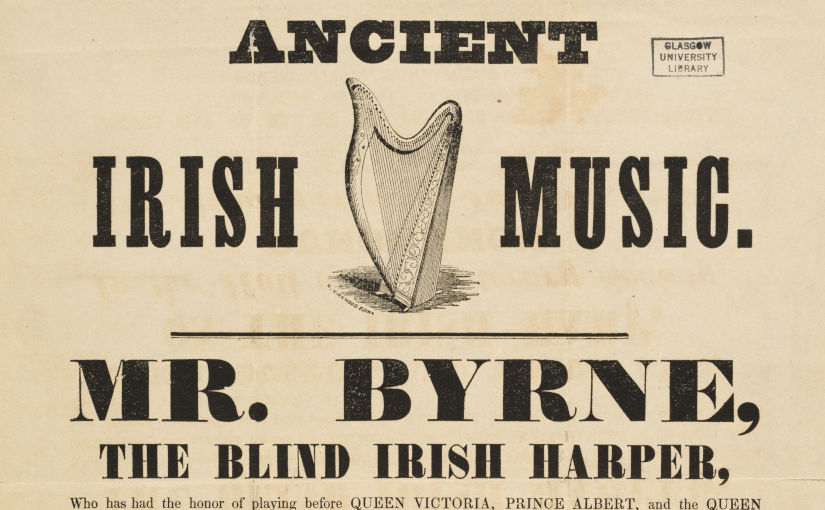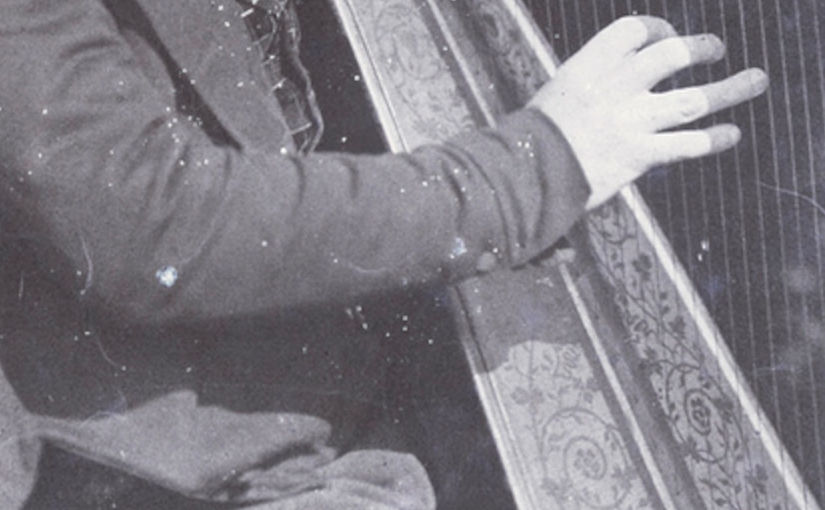The piper and scholar Jimmy O’Brein Moran told me about a mention of a harper in a piping manuscript in the National Library in Dublin. I went and looked at the manuscript. This post is to discuss what (if anything) we can usefully say about the harper.
Continue reading O’Connor from County TyroneTag: Long 19th century
This is a project to try and find out about Irish harpers who were continuing to play in the inherited tradition from 1790 through to about 1910. You can check my timeline showing all of the harpers.
These people (mostly men) learned from teachers who themselves had learned from teachers and so on in a lineage of tradition back through the 18th century harpers, playing on floor-standing wire-strung traditional Irish harps, using the traditional Irish harp playing techniques.
Patrick Byrne part 12: Scotland and Ireland, 1852
header image adapted from SNPG PGP HA 460 (used under license CC-BY-NC).
This post continues with the laborious process of trying to follow Patrick Byrne’s touring itinerary. This post covers 1852, when he went to Edinburgh and Fife, and then returned to Dublin and Monaghan.
As usual, you can read about his life and work up to this point, in my previous posts about him:
Part 1 covers Patrick Byrne’s early years and education, down to his discharge from harp school in 1822.
Part 2, looks at his early career, working for patrons in Ireland and England from 1822 to 1837.
Part 3 covers his first visit to Scotland over the winter of 1837-8, and his tour of Ireland in 1839-40.
Part 4 looks at him playing for Queen Victoria at Windsor Castle, and then touring mostly in Ireland and a bit in England in 1841-4.
Part 5 covers just six months, from when he went to Scotland at the beginning of 1845 until he headed back to Belfast on 25th June, including the Waverley Ball and having his photographs taken.
Part 6 covers the rest of 1845, and the whole of 1846, touring in the north of Ireland and the English midlands.
Part 7 covers Scotland in the first half of 1847, Ireland for the second part of 1847; England in the first part of 1848, and back in Ireland in Autumn 1848.
Part 8 covers Byrne’s trip to the south of England over Christmas 1848, where he played events in Hampshire and Wiltshire; and then the first half of 1849, when he went to Staffordshire and then came back to Ireland and met the antiquarian John Bell in Dungannon.
Part 9 covers his pursuit of Queen Victoria from Dublin to Balmoral in the summer of 1849.
Part 10 follows him from the end of 1849 through to the end of 1850, in the Scottish borders and touring Ulster.
Part 11 covers 1851, first in Warwickshire and Staffordshire and then back to Ireland: late spring in County Cavan; summer at the fashionable seaside resorts of south County Down, and then autumn at big houses in County Monaghan.
Sailing to Scotland, 6 Jan 1852
At the end of part 11, We left Patrick Byrne travelling on the overnight ferry from Belfast to either Greenock or Glasgow. He would have disembarked on the morning of Wed 7 Jan 1852, and got a train onwards to Edinburgh.
The news clippings we saw in part 11 already told us that Patrick Byrne had “an invitation to Dalkeith Palace, the residence of the Duke and Duchess of Buccleugh” (Newry Telegraph Thu 18 Dec 1851 p3), “where he will be engaged for a short time” (Belfast Newsletter, Fri 9 Jan 1852 p2)
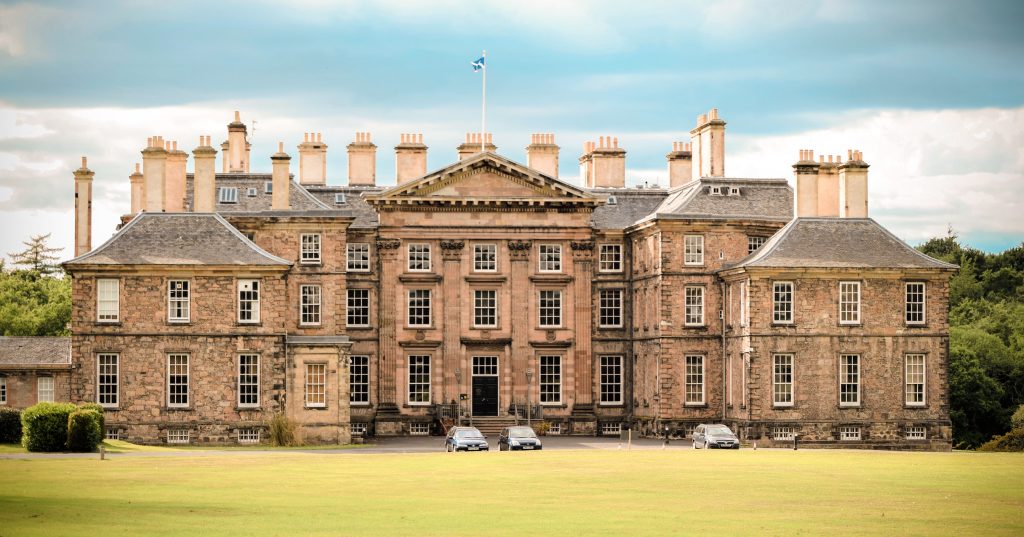
Byrne had been visiting the Duke and Duchess of Buccleugh for many years; they were one of his hosts on his first visit to Scotland in the winter of 1837-8 (see part 3). We saw him staying with them at their country seat at Bowhill in 1850 (see part 10), and we discussed then how he was apparently role-playing as Walter Scott’s Last Minstrel. However, I have not previously had a reference to Patrick Byrne visiting the Duke of Buccleugh at Dalkeith Palace, which is only 11km from Edinburgh.
Byrne’s stay at Dalkeith Palace was reported in the Edinburgh Advertiser, but I don’t have access to this newspaper so we have to rely on a reprint in the Dublin press:
IRISH MINSTRELS
Freemans Journal Tue 20 Jan 1852 p2, reprinted in Weekly Freemans Journal Sat 24 Jan 1852 p6, and Galway Mercury and Connaught Weekly Advertiser Sat 24 Jan 1852 p1
The lovers of the Irish harp will be glad to find, from the subjoined paragraph, copied from the Edinburgh Advertiser, that Byrne, the distinguished Irish harper, is sustaining in Scotland the character which he so deservedly acquired in his own country for his performances on the harp:-
“PATRICK BYRNE, THE IRISH HARPER. – This interesting blind artist, who is at present in Edinburgh, has been for the last week at Dalkeith Palace, assisting in the entertainment of a distinguished party, by the beautiful and romantic strains of his native minstrelsy.”
If we studied and collated the movements of the aristocrats and patrons, we could work out who was in the “distinguished party” at Dalkeith Palace in the middle of January 1852. But I want to concentrate on the harpers, so we will leave that for someone else to work on. Unfortunately without knowing the date this story was published in the Edinburgh Advertiser, we can’t work out when the “week” that Byrne was at Dalkeith started and finished.
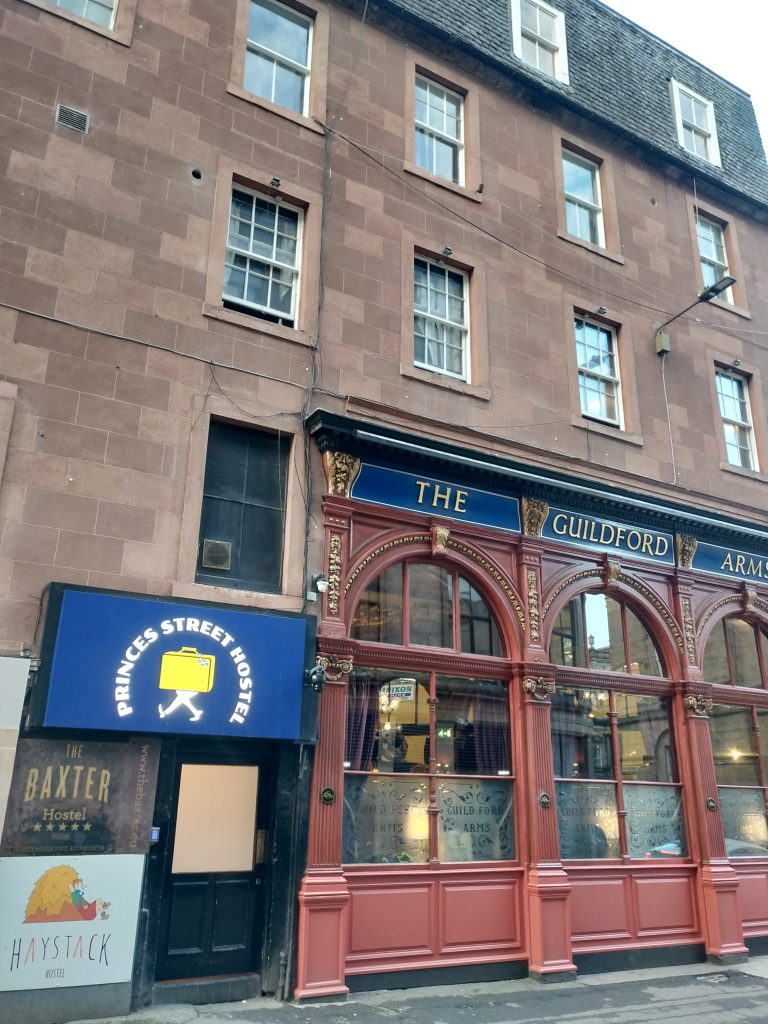
But some point before 20th Jan, he was already finished at Dalkeith, and was in Edinburgh, where he was looking for business playing for private gatherings in the big town houses of wealthy patrons.
As usual when he was in Edinburgh, we find Patrick Byrne staying at Mrs Thomson’s lodging-house, above the Guildford Arms pub, where the tourist hostels are now. I discussed this more in part 5 when he stayed there in 1845.
CARD.
Edinburgh Evening Courant Thu 22 Jan 1852 p1, via John Scully p82
_____
MR BYRNE, the Blind Irish Harper, who has had the honour of playing before Her Majesty, and of being appointed Irish Harper to Prince Albert, respectfully intimates that he is now in Edinburgh, and will be happy to ATTEND EVENING PARTIES with his Harp. Fee moderate.
Orders received by Mr Byrne at Mrs Thomson’s Lodgings, No. 3 West Register Street.
The same issue of the newspaper has an editorial comment on the advert:
THE IRISH HARP. – Mr. Byrne, the blind Irish harper, is at present in Edinburgh, and has delighted some evening parties with his excellent performance on the instrument of which he is so perfect a master. We believe that he is at present open to similar engagements.
Edinburgh Evening Courant Thu 22 Jan 1852 p3
Visiting the Borders
There is a lack of references for the next month or so; and so we don’t know how long Byrne spent in Edinburgh playing for private evening parties; but at some point he headed south, to the borders area where he had a little group of people to visit: his friend George Sudden in Clintmains, and the big houses at Spottiswoode, Bowhill, and Monteviot. We have no mention of him visiting these people at this time, though he may well have done. We do have retrospective information (published a few months later) about him visiting another big house in this area.
… he has been during the winter staying, chiefly at Dalkeith Palace and Stichel, the residences of the Duke of Buccleuch and his noble brother, Lord John Scott, whose kind patronage he has the honour to enjoy.
Freemans Journal Sat 5 Jun 1852 p2, reprinted in Newry Telegraph Tue 8 Jun 1852 p3
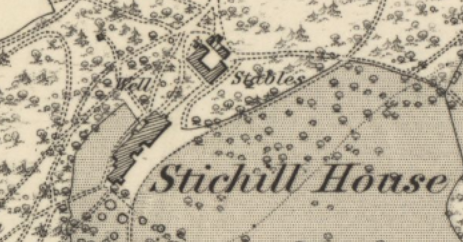
The old Stichill House was demolished around 1863-6, when the new Stichill house was built (the new house in turn was demolished mid-20th century). Lord John Scott was tenant of Stichill House from the 1840s through to 1853; John and Alicia appeared there in the 1851 census. However I am not currently finding much information about the old pre-1860s house. Stichill is very close to Kelso and so it seems likely that Byrne may well have been a regular visitor here whenever we have previously found him doing a concert in Kelso.
Patrick Byrne did a concert in Kelso on Friday 12th March 1852:
THE IRISH HARPER. – Mr Patrick Byrne, the blind Irish Harper, gave a concert in the Queen’s Head Assembly Rooms last Friday night, in Kelso, Scotland when a highly respectable, but not very numerous, company favoured him with their presence. The pieces which he performed consisted of selections from the Scotch, Welsh and Irish melodies, and were executed with a truth and fidelity seldom accomplished on this rare instrument. Mr Byrne seems to possess an entire mastery over the strings, and enters with such enthusiasm into the feelings and passions embodied in the peculiar music on which he dwells, that performer, harp, and melody become as it were, blended into one object, the contemplation of which powerfully recals to memory the ancient and expiring race to which he belongs. The harper appeared to be most at home with the lays of Ireland, and “The Harp that once in Tara’s Hall,” “Erin-go-Bragh,” and “Donnybrook Fair,” were given with exquisite taste and feeling – the variations in the last being executed with an extraordinary degree of brilliance and pathos.
Anglo-Celt Thu 18 Mar 1852 p2

This is a very interesting review for a lot of reasons. The venue is his usual place for giving public concerts in that area, the Queen’s Head Hotel in Kelso. The audience is “respectable” (i.e. relatively wealthy and high-status, not common riff-raff), but there are not very many of them. I am not finding any adverts or reviews in the Scottish press, only this article in the Anglo-Celt which is a newspaper based in Cavan town. I wonder where they got the story from, and who the reviewer was.
The comments about the “truth and fidelity seldom accomplished on this rare instrument” suggests to me that the reviewer has some familiarity with other players of the traditional wire-strung Irish harp. It is also interesting to see the comment about how Byrne “appeared to be most at home” with the traditional Irish tunes, which makes us think again about how he was choosing repertory; presumably there was music that audiences and patrons would want, which were not necessarily what he himself as a traditional musician would choose to play, or even which would be particularly well-suited to the traditional wire-strung Irish harp. The review mentions the standard “Scotch, Welsh and Irish” tunes. The three tunes named are also interesting; “The Harp that Once” is a great crossover piece, being instantly recognisable to lay audiences as the Thomas Moore song, and at the same time being a a tune from the inherited harp tradition. “Erin go Bragh” I think is the tune of Savourneen Deelish, which you can hear being played on the pipes by Leo Rowsome; and you can also listen to Donnybrook Fair played by piper Joe Byrne. Patrick Byrne plays variations to the tune of Donnybrook Fair, and it would be interesting to know what he did and how he handled them on the harp.
Patrick Byrne next travelled quite a way south, to Langholm. This is on the old main road from Edinburgh across the borders to Carlisle (the A7); Langholm is about 60km south-west from the area where Byrne usually stayed. This is two or three weeks after the Kelso concert, though we are not given the dates of his Langholm concerts.
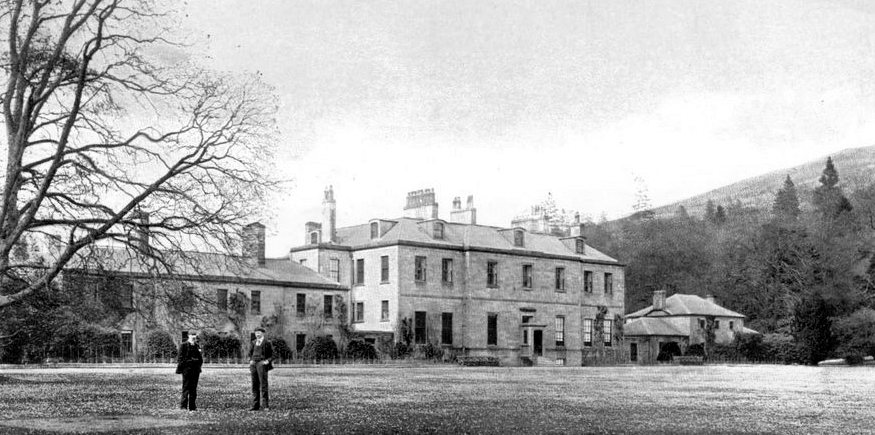
I think it is very likely that Byrne may well have travelled to Langholm with the Duke and Duchess of Buccleugh, who had massive grouse shooting moors there, and a house, Langholm Lodge. The main central part of the house was demolished in 1953 but the two separate end sections are still there. You can see a lot more photos of the house, and of the Duke and Duchess of Buccleugh there in the 1860s, at Langholm Picture Archive.
Anyway, while he was in Langholm, Patrick Byrne performed two public concerts, which were held in the Crown. But we are not told the dates of these two concerts. They must have been in the second half of March, or the first week of April 1852.
ANCIENT IRISH MUSIC. – Mr Byrne, the blind Irish harper, who has attained considerable celebrity as a performer on the Ancient Irish Harp, visited Langholm lately, and gave two concerts in the Crown Inn Assembly Room. On both occasions the attendance was highly respectable, and the audience seemed much pleased with Mr. Byrne’s execution on the harp: which, by the way, has neither semitones, flats, nor sharps, nevertheless, in the hands of Mr. Byrne, who is a delightful performer, its music is most pleasing. Mr Byrne expressed himself as highly gratified with the encouragement he received while here, and promised to come to Langholm again on his next visit to Scotland.
Eskdale and Liddesdale Advertiser Wed 7 Apr 1852 p3

This reviewer is clearly a lot less knowledgeable about the traditional wire-strung Irish harp than the Kelso reviewer; their very naive comments about “neither semitones, flats, nor sharps” shows that they have no concept of music or harps outside the classical system. Presumably they had seen a classical harp with a semitone mechanism which gave then enough knowledge of such things to be dangerous.
But from the review, it does sound like this may have been Patrick Byrne’s first visit to Langholm.
But we still don’t have much information about Byrne’s movements; I don’t have anything solid for the next month. It looks like Byrne headed back north towards Edinburgh at some point in April 1852.
The gossip from London and Warwickshire
In Patrick Byrne’s papers, preserved with the Shirley papers at the Public Record Office of Northern Ireland, there is a long and interesting letter to Patrick Byrne, written by H Atkins, at Eatington, Warwickshire, on Friday 30 Apr 1852. It seems as if this letter was sent to Byrne in Edinburgh, but unfortunately we don’t have the envelope. However this letter is obviously in reply to one that Byrne wrote and sent to Atkins at some point in April 1852.
Eatington
PRONI D3531/G/5
April 30th 1852
Dear sir
I would have answered
your letter a few days sooner
but I had only just returned from
London when I received yours
and I felt too [buisy] to be able for
a few days to attend to you
but as you said you thought of
remaining in Edinburgh till
after [??????], I hope this will reach
in time before you leave
it, I received lately two newspapers
from you, the one from Langholm
I received in London, it was read
by your friend[s] Si[mms] Stafford
& Price, afterwards Mr & Mrs. Ridd[?]
all of course much pleased to
hear of you and your good [success]
the [last] Mr G kept [till] [I] return
of course. Mr & Mrs Shirley also
saw them and were much
pleased I hope you may also meet
with kind friends in Edinburgh
I suppose you mean then to return
to Ireland, the accounts from
Farney I believe are good.
I hear Mr Evelyn as made up
his mind to take his family
there this year and is anxious
to go there in June at present
it is not quit decided, but he
generally puts in practice what
he wishes, as Mrs Shirley at
all times likes to be there, he
is the less likely to meet with
opposition. Mr Shirley is very
well and looks well, I wish
I could say the same of Mrs
Shirley, our visit to London
was to the Dr. She as been declin-
ing ever since she was in
Ireland, but I hope the change
of weather, and change of season
may be of use to her, she says she
feels better and I hope she does
She follows her usual occupation
and appears in society just
the same still there is a visible
change in her, I own I often feel
dispirited about her, but then
again I hope all may yet be well
She is thinking and often speaking
of going to Ireland, Lady & Miss
Heathecote are now in London
visiting Mr & Mrs Malcolm
Miss Heathecote was presented
at the Drawing Room yester-
day, Mrs Heathecote as been very
unwell so as to cause some anxiety
but is now again much better. M[rs]
Shirley was at Hursley 3 nights
about a month past they were all
making great Enquiries about you
your old Friend Mrs Clough was
quite well also Mr & Mrs Ste[??]son
the children & Miss Barker are
shortly to spend a fortnight here
the [Colonl] as taken a House
near to the Town of Lutterworth
he is now in Dublin giving up
the House he had there and he
is to return on Monday and entr
upon the one he as taken there
are several packs of Fox Hounds
near there is the cause of his
taking a House there
Mr & Mrs Gardiner and the little
boy are quite well. I am thankful
to say Mrs [Master] is much better
than we ever expected to see her
we feel quite in hopes that her
Health will be quite reestablished
I left Mr Mrs Riddell quite
well, He ages very fast but
she is looking much as usual
they are just gone to a new
Lodging 13 Ebury Street pimlico
your old friends Henderson
Hutchinson & Lowes are all
quit[e] well and I think by all
appearance there will shortly
be an [increase] in the Family of
the Latter_ and now for Hopeing that
you are in Good Health and
that you and your old Harp
are kindly received in that
old Town of which I have a
desire to see, I must now
remain yours very Truly
H Atkins
The letter has two aspects which we should perhaps consider separately. The most useful for us is what the letter can tell us about what Byrne himself has been doing.
Atkins refers to things that Byrne has sent him. He mentions that Byrne has sent him “two newspapers”; Atkins says that he got the one from Langholm when he was still in London, and he says that he showed it to various people there. Presumably this was the Eskdale and Liddesdale Advertiser of Wed 7 Apr 1852, which contained the clipping about the concert in the Crown Inn. It sounds like the second newspaper was posted after that, and arrived in London after Atkins had already left to travel North to Warwickshire. I don’t know what this newspaper might have been. I suppose it is possible that Byrne did not get a copy of the earlier Kelso newspaper until later on. Or it is possible there was another news article about a different event from after 7 April, which I have not found yet.
This is very interesting to see Patrick Byrne collecting news clippings about himself, and posting them to his contacts. The lost manuscript “Autobiography of Patrick Byrne” which is listed in the 1872 catalogue of the library at Lough Fea contained “printed cuttings relating to him”, presumably including these ones that Byrne had posted to Atkins.
Atkins also mentions that after he had returned to Warwickshire, another letter from Byrne arrived there. So that is three things Byrne had posted to Atkins within a week or so I suppose.
Atkins quotes Byrne’s information back to him: “you said you thought of remaining in Edinburgh till after [??????]”. Unfortunately I can’t read when Byrne is staying in Edinburgh until. But whatever, this tells us that Byrne was in Edinburgh again in mid to late April, after he had done the Kelso and Langholm concerts.
The other aspect of the letter is the gossip about the aristocratic patrons in England. I think this is a job for someone else, to collate all of these people and their movements and connections. But we can see I think that the reason Byrne is being sent this information is as a part of his professional work, cosying up to these people. He would find all of this gossip very useful to him because then when he met one of these people he would be able to ask them most ingratiatingly about things relevant to them.
We can also see how these people meet each other socially, and so we can realise that when Byrne was visiting one of them, others would be there also visiting, and so they would meet him and hear him play not only in their own houses but also at the houses of other wealthy patrons.
A lot of the names here I don’t recognise, and I am not spending too much time looking them up because at the end of the day we are here for the traditional harpers, not for their aristocratic patrons. My main frustration is not knowing who H Atkins is. It looks like Byrne has an ongoing relationship with Atkins; I presume that Atkins was a senior member of staff at Evelyn Shirley’s house in Warwickshire, Eatington Park.
There are a few names that I do recognise. Obviously we can see Mr and Mrs Shirley; this most likely refers to Byrne’s main patron, Evelyn J Shirley (1788-1856) and his wife Eliza. I don’t know how we can tell without context whether it is the father E J Shirley, or the son son Evelyn P Shirley (1812-1882) who is being referred to but the letter implies to me it is the father here. We can also recognise two of Evelyn J and Eliza’s daughters on this list: daughter Louisa (1819 – 1887) married Neil Malcolm, 13th of Poltalloch (1797-1857) and so became Mrs Malcolm (see part 10 for Byrne’s visit to them at Kilmartin); and daughter Selina (1814-1901) married Sir William Heathcote, 5th Baronet (1801 – 1881), who owned Hursley House near Winchester, Hampshire. Selina and William had four daughters; but they would have been too young to have been presented to Victoria on 29th April 1852. My guess is that Miss Heathcote was Selina’s step-daughter, Caroline Elizabeth Heathcote (1833 – 1910). If you recognise any of these other names or can connect them in to the Shirley family and circle please feel free to add the information in the comments below.
In St Andrews, May 1852
At the end of April, Patrick Byrne travelled north-east from Edinburgh, to visit Fife, where he played for private patrons, though we are not told who they were.
ST ANDREWS
Fife Herald Thu 6 May 1852 p3
[…]
CONCERTS. – During the past week, Mr. Byrne, the well-known blind Irish harper, has been residing with us, and has already performed at several private parties, where he is considered a great treat. We hear that Mr B. is to give two public entertainments.
The two concerts were in the morning of Thursday 6th May, and the evening of Friday 7th May 1852. They were held in the Town Hall, presumably in the big upstairs room. This was not the present Town Hall which was not built until 1858-62. The old Town Hall or Tollbooth stood in the centre of Market Street, between the Subway take-away and the Keys bar. Its footprint is currently marked by stones inlaid into the road surface.
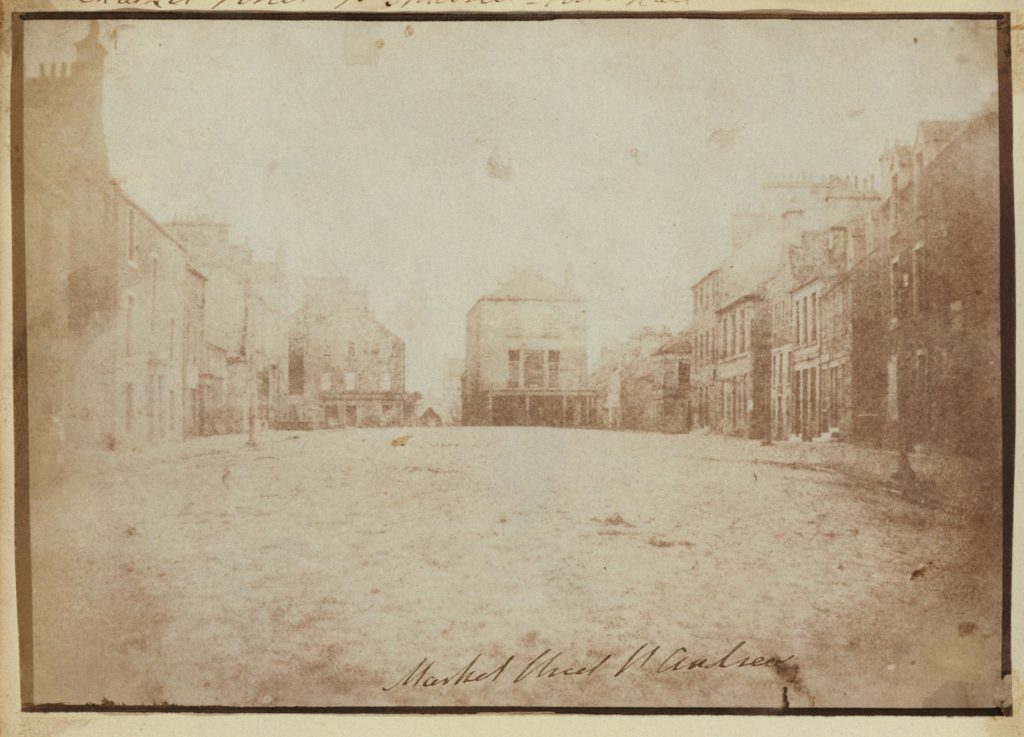
I don’t have the adverts for these concerts, but we do have a couple of reviews which describe them.
MR. BYRNE’S CONCERTS. – As we intimated in our last, Mr Byrne gave a concert on Thursday morning, and Friday evening, in the Town Hall, on the Irish Harp. On both occasions, there were pretty good houses, and the performance was highly pleasing to the auditory.
Fife Herald Thu 13 May 1852 p3
MR. BYRNE, THE BLIND IRISH HARPER, has been here for some days, delighting all who have heard him touch his instrument. He gave two entertainments in the Town Hall, which were well attended, besides performing nightly at private parties. His execution is very delightful – his fortes always well timed, and his pianos very exquisite. He is a very intelligent, agreeable man, and we hope will be long spared to be a fine specimen of the ‘Blythe old harper.’
Fifeshire Journal Thu 13 May 1852 p3
Letters to Patrick Byrne
We have two different letters that were written to Patrick Byrne while he was in St Andrews. The preservation of Patrick Byrne’s letters seems very patchy; presumably he was receiving letters like this regularly at other times, but did not keep most of them. I don’t know if this is just because as we get closer to the end of his life we naturally have more of his papers preserved.
The first letter has no envelope giving Byrne’s address, so we don’t know if it was sent to him in St Andrews, or somewhere else. If it was sent to Edinburgh or another patron in Scotland it might have been weeks before he received it. But at least it is signed and dated.
My dear Byrne
PRONI D3531/G/5
I have had some difficulty
in finding your direction
but having this morning
got it I lose no time in
writing to you.
There is to be an Exhibition
in Cork of Irish manufac=
=ture to open the 10th of June
and we expect that it
will be well worth seeing
and be very well attended
I suggested to the Committee
that there should be an
Irish Harper to attend
there, which was at
once acceeded to, and
I was requested to
ask you if you could
come, and if so <on> what
terms. Let me have an
answer as soon as possible
and I hope sincerely you
may be able, as Mrs Tooker
and I should be very
happy to see you, and
to hear you again.
The Lord Leiutenant and
his Lady are to be present
at the opening, and
the Exhibition will be
open for two months. I
am to have my Harp put
= in order to be shewn
Mrs Tooker desires her
remembrance to to you
and Believe me yours
very truly
Richd B Tooker
The Mardyke
Cork May 8 1852
I am staying at the
Lea Side at present
but direct to me at my
place Mardyke
Cork
This is very interesting to see Patrick Byrne, travelling in Scotland, but dealing with proposals for events in Ireland in just a months time. We already met Richard Beare Tooker back in 1843, when he wrote a letter to Byrne (see part 4). In that letter, Richard mentions “the Harp you got me”. I checked the official catalogue, and R. B. Tooker is listed (p.23) as exhibiting “Irish MSS”, but not a harp. I suppose the harp may have been exhibited under a different person’s name; on the same page John Windele is listed as exhibiting “An Irish harp constructed on the ancient model…” but I still have no idea what Tooker’s harp was.
In any case, there doesn’t seem to be a harper mentioned in any of the news reports of the exhibition, so this proposal for an event didn’t get anywhere. Perhaps Tooker sent it to the wrong place and Byrne never got it in time to act. I don’t know. We always have to remember that the date on the letter is when it was written, not when it was received.
Three days after Tooker, a different correspondent was sending stuff to Patrick Byrne in St Andrews.

The second letter is not really a letter at all; it is a song lyric sheet, handwritten by the author of the songs. However it is not preserved with the other songs in PRONI G/3, but with the letters in G/5. It is preserved inside its small bluish envelope, which is addressed to Patrick Byrne:
Mr. Byrne
PRONI D3531/G/5
College Street
St Andrews
The envelope is monogrammed by the sender at bottom left but I can’t read the monogram. There is no stamp, suggesting it was to be delivered by hand. I imagine this one got to Byrne the same day it was written.
The song sheet is a big piece of paper folded in half to make a four page booklet, and then folded in half three more times to fit into the little envelope. I think there are two different songs, written on three-and-a-half sides, in difficult spiky handwriting. At the end is a little footnote:
To Mr Byrne
PRONI D3531/G/5
From his friend [& wellwisher] the author
John [Campbell]
The Priory 11th May 1852

John Campbell of Glen Saddell (1794–1859) was a sportsman, orphaned young, who spent too much money and sold the ancestral lands at Glen Saddell. He had a flat in London, a flat in Paris, and a hunting box in Melton Mowbray. He was a keen golfer, and you can see him taking part in a golf tournament in St Andrews in the famous painting of 1847 (he is to the right in a green-grey coat, just left of the ginger-beer girl). He married Henrietta Marian McLeod (1817-1877), the daughter of McLeod of Dunvegan. I think their house in St Andrews must be Priory House which was built in the cloister of the ruined cathedral as you can see in the photo. The house was demolished after 1949 when it was acquired by the state, as part of preserving the cathedral ruins.
I imagine that Byrne was at the Priory to play for a private party; I imagine he discussed hunting songs with John Campbell, and so John Campbell wrote out the text of two songs on the piece of paper, and sent it to Byrne. The first song is a fox-hunting song, which has seven-and-a-half eight-line stanzas, and begins:
Sing, Sing, Music [was given]
PRONI D3531/G/5
To brighten the joys which spring from the [chase], Sir
Drink sport to the hounds who make our castle [heaven]
And joy to their master, the pride of our race, Sir
…
We can recognise this as a parody of Thomas Moore’s song “Sing, Sing, Music was given…” from the 9th number of Irish Melodies in 1824. You can look at an 1890s reprint. Moore gives the title of the tune for his song as “The humours of Ballamaguiry or the old Langolee“.
The second song is titled “Melton Song” and has two verses, each of ten lines; it begins:
Rouse boys <rouse> tis a fine hunting morning
PRONI D3531/G/5
Rouse boys rouse, let us join in the chase
Let not the time fly whilst you are adorning
But on to cover hie, at a brisk pace.
…
You can see the whole of this song in Mrs. Chaworth Musters’ Book of Hunting Songs (1885) p91. You’ll see that Campbell’s autograph text is slightly different from the book; this in itself would be a fine literary study for a song scholar. The letter includes only the first and last verse of the book version. I also have not found this song under the title “Melton Song”. This could be followed up further. I also don’t know what the tune is for this song.
I am not that interested in these hunting songs. Someone else should do an edition of all the song texts in Patrick Byrne’s papers and collate them against other sources.
Moving on to Cupar, May 1852
The same issue of the Fifeshire Journal we read earlier, which mentioned his two concerts and nightly parties in St Andrews, has another article in the previous column under “Cupar”, giving more up-to date information. By this date, Thur 13th May, Patrick Byrne had left St Andrews and moved on down the road to Cupar.
MR. BYRNE, THE WELL-KNOWN BLIND IRISH HARPER, is now on a visit to Cupar and neighbourhood, delighting select parties with his unrivalled execution on the ancient musical instrument of his native land. We trust he will not leave the district without affording the inhabitants an opportunity of publicly witnessing the performance of a genuine ‘old Irish harper.’
Fifeshire Journal Thu 13 May 1852 p3
Their hope for a public concert came true, and Patrick Byrne played on Tuesday 18th May 1852 in the Tontine Hall in Cupar. I think this is the Tontine Hotel which used to stand on Catherine Street, at the corner where the roundabout is now; it was demolished in the 1920s and the site now has a new extension to the County Buildings.
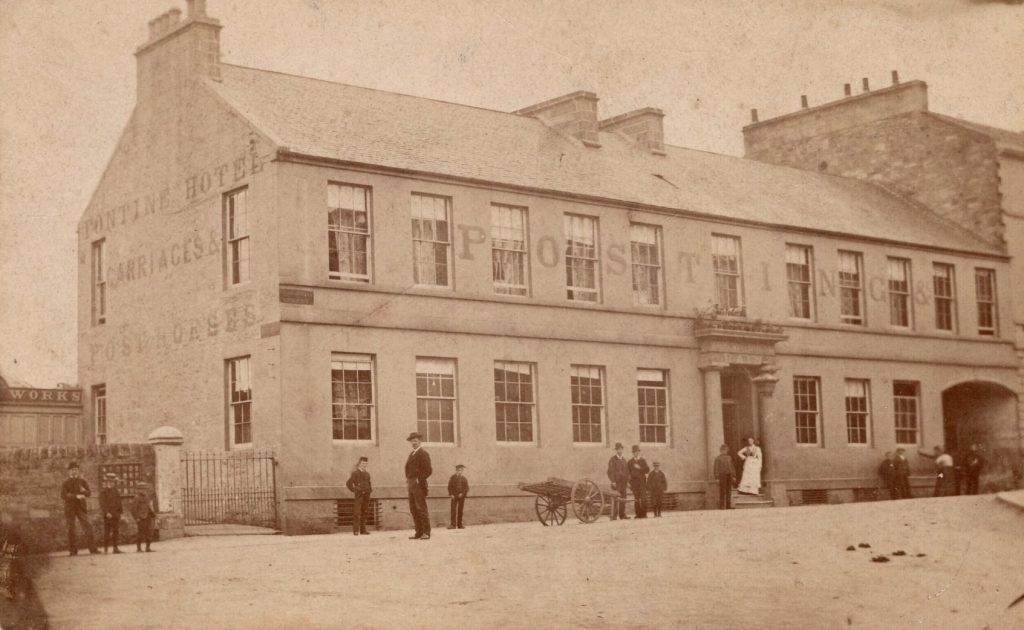
THE IRISH HARP. – On Tuesday evening Patrick Byrne, the celebrated Irish harper, whose arrival in Cupar we noticed in our last, gave one of his well-known entertainments in the Tontine Hall, which we are happy to say was crowded by a most respectable audience, who testified by their repeated approbation the spirit with which they enjoyed his performances on the ancient national instrument of the Emerald Isle. Mr Byrne, we understand, has left Fife to perform before the Viceregal Court in Dublin – a circumstance which will deprive for a time other towns in the county from enjoying his treat.
Fifeshire Journal Thu 20 May 1852 p3
As usual I have added these places to my map. Here you can see the places in St Andrews and Cupar.
Back to Dublin, May 1852
Probably on Wednesday 19th May 1852, Patrick Byrne set off from Cupar to head back to Dublin. Presumably he had been sent a letter from the Viceregal Court, commanding him to come there and play; but we don’t have that letter. In fact after this little flurry of correspondence we don’t have any more dated letters surviving in Patrick Byrne’s papers for the next year and a half. I don’t understand this pattern of what survives and what has been lost.
It is two weeks after his leaving Fife before we find him again in the Dublin newspapers:
Mr. P. Byrne, the well-known Irish harper, has arrived in Dublin, from Scotland, where he has been during the winter staying, chiefly at Dalkeith Palace and Stichel, the residences of the Duke of Buccleuch and his noble brother, Lord John Scott, whose kind patronage he has the honour to enjoy.
Freemans Journal Sat 5 Jun 1852 p2, reprinted in Newry Telegraph Tue 8 Jun 1852 p3
It looks like Byrne was busy in early June, playing every evening at different private house parties.
IRISH MINSTRELSY.
Freemans Journal Fri 11 Jun 1852 p2
The visit of Byrne, the celebrated Irish harper, to Dublin, after his long sojourn in Scotland, is nightly affording to the lovers of Irish music in this city a musical treat of no ordinary character. Byrne’s powers over the national instrument are of the very highest class, and have deservedly procured for him the reputation of being the first of the “Minstrel Brotherhood,” a chapter which, we regret to say, is not now so full as it was in days of yore. It is always a pleasing duty to prefer the claims or note the rising fame of our meritorious countrymen, in any of the walks of art. When Byrne received the appointment of Irish Harper to Prince Albert, and had conferred upon him the still more remarkable distinction of being summoned to play before the Queen in her mountain home in the Scotch highlands, the unusually good fortune of the Irish harper, instead of creating envy, produced a feeling of very general satisfaction. Now that he is once more amongst his own countrymen, we are rejoiced to find he is experiencing a welcome, not as wild, but withal as warm and as touching as the sounds of his own harp.
On Thursday 17th June 1852, Patrick Byrne played at the Viceregal Lodge in Phoenix Park. This was almost a month after he left Cupar, apparently in a hurry to get to Dublin. I don’t know if we are missing an earlier appearance at the Lodge, or what.
On 1st March 1852, Archibald William Montgomerie, 13th Earl of Eglinton (1812 – 1861) had been appointed Lord Lieutenant; his wife, Lady Eglinton, was Theresa, née Newcomen (1809 1853), widow of Richard Cockerell. So this is Patrick Byrne’s first appearance before them since Archibald became Lord Lieutenant.
Perhaps Patrick Byrne had headed back to Dublin on his own initiative, hoping to get an invitation from the new Lord Lieutenant.
The Dublin Evening Post has two separate articles mentioning Byrne at the Lodge, both on the same page. The first one was widely reprinted:
Mr. Byrne, the Irish harper, has returned to Dublin, after a long residence in Scotland, where he has been a welcome visitor at the princely residence of the Duke of Buccleugh and several other places of distinction amongst the nobility and gentry of Scotland. Mr. Byrne is at present on leave from his Royal master, Prince Albert; and on Thursday, by desire, we understand, of their Excellencies the Lord Lieutenant and the Countess of Eglinton, he had the honour of performing on the harp, at the Viceregal Lodge, where a numerous assemblage were highly pleased with his skilful execution on the Irish harp.
Dublin Evening Post Sat 19 Jun 1852 p3, reprinted in Freemans Journal Mon 21 Jun 1852, The Evening Freeman Tue 22 Jun 1852 p3, Belfast News Letter Wed 23 Jun 1852 p2, Kilkenny Journal and Leinster Commercial and Literary Advertiser Wed 23 Jun 1852 p4, Leinster Express Sat 26 Jun 1852 p4
The second one gives us a lot more specific information about the event at the Lodge; interestingly, Burne is not actually in the house itself, but in a tent on the lawn:
VICEREGAL COURT. – MORNING PARTY. – On Thursday their Excellencies the Lord Lieutenant and the Countess of Eglinton gave their first morning party at the Park. It was numerously attended; and notwithstanding the extremely unfavourable state of the weather, every one seemed pleased and satisfied. The company began to assemble shortly before three o’clock, and equipages continued to drive up to the Lodge till fully half-past four. Hanlon’s quadrille band was stationed in the dining-room, which apartment was set apart for dancing, refreshments being served in the breakfast-room; and a splendid collation was laid in the new ball-room, built by the late Earl of Bessborough. – The splendid band of the 52d Regiment, stationed in one of the tents erected in the lawn, performed some well-selected airs during the afternoon. In one of the marquees, Mr. Byrne, the celebrated Irish harper, delighted the company with a selection of favourite Irish airs. Their Excellencies, accompanied by Colonel Campbell, Captain Cust, Hon W. Hutchinson, A.D.C in Waiting, Captain Theasinger, and Admiral Montgomerie, entered the dining-room shortly before three o’clock, and in about half-an-hour afterwards dancing commenced. Amongst the company present were the following: – The Lord Mayor, the Lady Mayoress, [plus the names of a hundred or more other people]
Dublin Evening Post Sat 19 Jun 1852 p3, reprinted (without the massive list of names) in Belfast Mercury Tue 22 Jun 1852 p4
John Scully found this strange puff piece from the following week. It does not seem to tell us anything.
THE IRISH HARP. – “The wild sweetness” of the Irish Harp has been the inspiration and the theme of Moore in many of those captivating creations which adorn the pages of his never-fading lyrics, and never has it been “touched by hands less unworthy” than those of Mr. Patrick Byrne, the Irish Minstrel, a native of the county of Monaghan. Mr. Byrne, as we have already stated, is at present in Dublin, on leave from his Royal Master Prince Albert, and is almost every evening at private parties and reunions of the nobility and gentry, performing on the harp to the great delight of all who hear his wonderfully sweet and most pleasing execution, in which the fascinating wildness of the Irish music is evolved in the true style of Irish minstrilsy.
Dublin Evening Post Sat 26 Jun 1852 p3, via John Scully p84
Actually though it is interesting to see the comments about him “almost every evening” out at a different grand townhouse entertaining private gatherings.
On Saturday 3rd July 1852, Patrick Byrne was back at the Viceregal Lodge in Phoenix park, for another similar event.
VICEREGAL COURT. – On Saturday their Excellencies the Lord Lieutenant and the Countess of Eglinton gave their second party at the Viceregal Lodge. Two bands (the 63d and 81st) were stationed at different parts of the ground, and Hanlon’s quadrille band occupied the orchestre in the ball-room. Byrne, the celebrated Irish harper, was also present, and played several national airs. Shortly before three o’clock the company began to assemble, and for upwards of two hours an unbroken line of carriages continued to arrive. The Lodge presented a very gay and imposing appearance, the entrance hall being decorated with a profusion of hot-house flowers. The dining and breakfast rooms were set apart for dancing, and refreshments were served in the new ball room. Their Excellencies entered the rooms about three o’clock, accompanied by the Misses Cockrell, Miss Lestrange, Lady Margaret Bourke, and Lord Nigel Kennedy, and attended by Captain Cust, private secretary, and Major George Bagot, aide-de-camp in waiting, immediately after which dancing commenced, and continued with great spirit during the whole of the afternoon. The company, which was most brilliant and numerous, included the leading nobility and gentry at present in town.
Freeman’s Journal Tue 6 Jul 1852 p3, via John Scully p84-5
I think Byrne’s role at this second party is less clear, and we are not even told if he was in the house, or outside in a tent.
Dartrey, summer 1852
We now have a gap of two months before we hear more of what Byrne is up to. But we are told that, at some point over that period, he had been at Dartrey, in county Monaghan, visiting Richard Dawson, 3rd Baron Cremorne (1817 – 1897) and his wife Augusta née Stanley, Lady Cremorne (1823 – 1887).

We have already come across them in part 11. On 1st December 1851, Lady Cremorne had replied to a letter Byrne had sent her, telling him he could not visit them at that point, but that he should get in touch next time he was in the area. Well he obviously did, and he must have got an invitation to go to Dartrey in July or August 1852. However we don’t have any of the correspondence organising this visit or anything else apart from a brief line in the Northern Standard Sat 11 Sep 1852 p2 (see below).
The visit was obviously a success, since Lord and Lady Cremorne issued to Patrick Byrne “an invitation to make Dartrey House his home when ever he again visited that part of the country”.
Annual visit to Monaghan
After finishing at Dartrey, Patrick Byrne was in Monaghan town.
THE IRISH HARP.
Northern Standard Sat 11 Sep 1852 p2, reprinted in The Evening Freeman Tue 14 Sep 1852 p2
Our old friend Byrne, the father of Irish Bardic Music, has just paid us one of his annual visits, and his welcome was as warm as it ever was. Previous to his coming to Monaghan, he was staying at Dartrey House, on a visit to Lord Cremorne. We believe this was the first time he visited the Cremorne family, and so pleased was the noble proprietor and his amiable consort with his performance, that an invitation to make Dartrey House his home when ever he again visited that part of the country was freely accorded to the Bard. On Thursday evening, a few gentlemen resident in Monaghan, and private friends of Mr. Byrne’s, entertained him to supper, at Campbell’s Hotel, when a pleasant evening abounding in mirth, music, and good fellowship was spent, to the entire satisfaction of every one present.
So a dinner was held in honour of Patrick Byrne, on Thursday 9th September 1852. I tried to work out where Campbell’s Hotel was. The 1852 Belfast and Province of Ulster street directory lists E. Campbell at the Stag Hotel, Dublin Street, Monaghan. In the street directories for 1858-9 and 1863-4, it is Joseph Campbell who has the Stag Hotel. In the 1860 Griffith valuation, Sarah Campbell is the leaseholder of Dublin Street plot no.57: Hotel, offices, yard and garden. (These are not street numbers; Griffith uses its own logic of numbering plots).
On the Griffiths town plan, Dublin Street plot 57 is divided by a dotted line. Right of the dotted line (where Mag Chinese restaurant is now) is labelled “57” and is obviously Sarah Campbell’s hotel. Left of the dotted line (where McKenna’s bar is now) is labelled “a” though this does not seem to correspond to anything in the Griffiths listings as far as I can see. On the wing that runs back to the left of the dotted line, is written “upper story / held in 57”. So I would understand this to indicate that the Stag Hotel occupied the whole of the building except for the ground floor to the left of the dotted line. The present day wooden shop-front on McKenna’s bar corresponds to that ground floor left hand end of the building.
Because the Stag Hotel was near the west end of Dublin Street (closer to the town), the building is visible on some old photos of the Diamond. The earliest I have found so far is a photograph taken 1877.
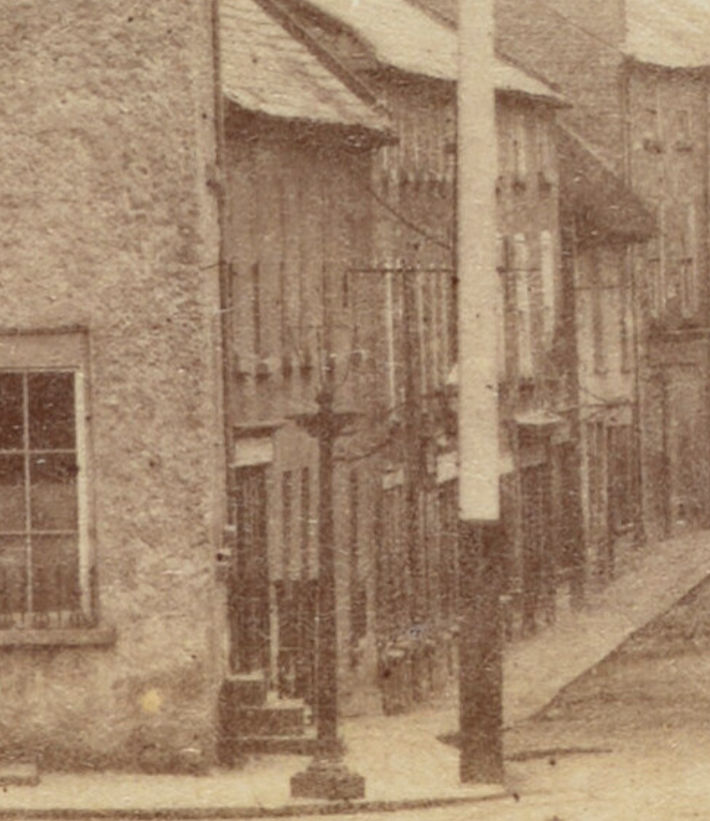
You can just about see the front of the Stag Hotel to the left of the tall white post, partly obscured by the curve of the street and by the corner of the building nearer us, and also obscured by the dark post (perhaps a lamp post) on the corner. You can just about see the wooden shop front, partly hidden behind the corner of the building in the foreground and partly behind the stone steps. You can see the roof is lower than the buildings on either side, and you can see six tall windows on the upper floor. On the ground floor, to the right of the wooden shop front, you can just about make out two tall windows, and then I think the hotel front door is hidden by the dark lamp-post, and then there is one single tall window at the right end of the building. It also looks like there is an iron bracket between the fifth and sixth upper windows, for a sign to hang from, though I think the sign-board is missing. It looks like there is a long curved lamp-bracket sticking out above the hotel front door; I think you can just about see the lamp beneath the bracket.
The Hotel is more clearly visible in a couple of different postcards from the late 1800s or early 1900s. In this photo-postcard here, we can clearly see a 6-bay 2-storey building, with the wooden shop-front in the left two bays. In this picture, we can also see the front door of the hotel, and the lamp bracket which is attached to the wall above the door.
In a postcard from perhaps the late 1940s, we see that the premises is now three storeys high, and has only four bays of windows, the same as what we see today; you can check the modern Street View, to compare.
McKenna’s bar is listed on the National Inventory of Architectural Heritage, and they suggest it was built in about 1850. However I don’t think this can be right. At the very least, the upper levels of the whole building were newly built in the early 20th century. it is possible that the old 2-storey building was entirely levelled to the ground and totally rebuilt in the early 20th century. But we can see the wooden frontage of where McKenna’s bar is now, in every picture from the present day right back to 1877. Is it possible that this wooden frontage is original, and was retained when the whole building was re-modelled? I don’t know.
Anyway enough about the Stag Hotel. Patrick Byrne only went there to eat dinner with some friends and supporters.
Portaferry
It looks to me like Patrick Byrne was already away from Monaghan by Sat 11 Sep 1852. It seems he may have gone up to county Antrim, though I have no references to that apart from a line in the next clipping four weeks later, saying he was “passing through” Belfast on his way south. I assume “this town” is Belfast. It is all a bit unsatisfactory.
Mr. Patrick Byrne, the famous Irish harper, passed through town yesterday en route to Portaferry House. We were pleased to see this favourite minstrel in such excellent health and spirits.
Belfast News Letter Fri 8 Oct 1852 p2, via John Scully p85
We saw Patrick Byrne visiting Nugent at Portaferry back in September 1850, just before he played for Lord Londonderry and the Lord Lieutenant at Mountstewart (see part 10). At that point I was being cautious but now it is clear he was actually visiting Patrick John Nugent (1804-57), of Portaferry House, back then as well as in October 1852.
Portaferry House is still there, used as a private residence.
Family mattters
I think it is also quite likely that Patrick Byrne spent some time with his family. We have information from this time from his much younger half-brother Christopher, who had just turned 18 years old in November 1852:
Mr. Byrne, of whom this biography is written, was born in Carrick Macross, County Monaghan, Ireland, in November, 1834, and was reared on a farm in his native land, where he was given but limited advantages for education, as such was all that was afforded the majority of people in those days. He remained under the parental roof until November, 1852, at which time he came to America, making the voyage in a sailing vessel, and landed in New York eight weeks and three days from the date he left his native land. He was practically penniless and among strangers in a strange land…
G.A. Ogle, Memorial and Biographical Record… 1898 p448
It sounds like Patrick Byrne’s family in Greaghlone were not doing so well. As soon as he reached 18, Christopher left; at least one of his sisters (Elizabeth I think) was already in Ohio. We can only imagine Patrick Byrne’s visits back to his childhood places and his relatives; not only his half-siblings but also nephews and nieces, and Christopher mentions in his letter (PRONI D3531/G/6) cousins as well. We know that Patrick Byrne’s only full sister, Alice Ward, was living in the Ward’s farm at Beagh, and apparently doing well, and I would imagine Patrick Byrne would go to see her at least once a year and perhaps more often when he was around County Monaghan. But we have no records of this.
We also don’t know what Patrick Byrne was doing over Christmas 1852. He may have gone to Lough Fea, or to Warwickshire, or perhaps even to Hursley in Hampshire to visit Evelyn Shirley’s daughter Selina. I don’t know. We will pick up the story in Winchester in January 1853 in the next part.
Patrick Byrne part 11: England and Ulster in 1851
Header photo: Calotype E (detail). Heritage Collections, University of Edinburgh, Coll-1073, CC-BY
This post follows the traditional Irish harper Patrick Byrne on his travels over the course of 1851. Patrick Byrne was in Warwickshire and Staffordshire for the first three months of the year; then he returned to Ireland, where he spent May and June around County Cavan; he spent the summer working in the fashionable seaside resorts of south County Down, and then he spent the autumn back in County Monaghan working for aristocratic patrons at their enormous country houses. We will work through the sources to try and reconstruct his itinerary and see the places that he was visiting.
Continue reading Patrick Byrne part 11: England and Ulster in 1851Patrick Byrne part 10: in the Scottish borders and touring Ulster, 1850
And so we continue to try and work through all of the documents for the life of the traditional Irish harper, Patrick Byrne (1790s – 1863).
You can catch up with his life and work up to this point, in my previous posts about him:
Part 1 covers Patrick Byrne’s early years and education, down to his discharge from harp school in 1822.
Part 2, looks at his early career, working for patrons in Ireland and England from 1822 to 1837.
Part 3 covers his first visit to Scotland over the winter of 1837-8, and his tour of Ireland in 1839-40.
Part 4 looks at him playing for Queen Victoria at Windsor Castle, and then touring mostly in Ireland and a bit in England in 1841-4.
Part 5 covers just six months, from when he went to Scotland at the beginning of 1845 until he headed back to Belfast on 25th June, including the Waverley Ball and having his photographs taken.
Part 6 covers the rest of 1845, and the whole of 1846, touring in the north of Ireland and the English midlands.
Part 7 covers Scotland in the first half of 1847, Ireland for the second part of 1847; England in the first part of 1848, and back in Ireland in Autumn 1848.
Part 8 covers Byrne’s trip to the south of England over Christmas 1848, where he played events in Hampshire and Wiltshire; and then the first half of 1849, when he went to Staffordshire and then came back to Ireland and met the antiquarian John Bell in Dungannon.
Part 9 covers his pursuit of Queen Victoria from Dublin to Balmoral in the summer of 1849.
This post (part 10) follows him from the end of 1849 through to the end of 1850, in the Scottish borders and touring Ulster.
James Duncan
James Duncan was a traditional Irish harper in the 18th century. But since he was still alive in 1792, he was active during my Long 19th Century study period (1792 – 1909) and so I should try to say something useful about what he was doing from 1792 onwards.
Continue reading James DuncanIrish harpers in the census records
Since the early 19th century, with one or two gaps, a census has been taken every 10 years, to record the entire population of the United Kingdom. During the 19th century, Ireland, England, Wales and Scotland were all part of the UK, but they were administered differently. The first census in England, Scotland, and Wales was done in 1801, though at first only aggregate numbers of people were collected. The authorities in Ireland started a bit later; they tried to do a census in 1813, but apparently it was not completed. The first census in Ireland to be actually done was in 1821.
Continue reading Irish harpers in the census recordsMary Doran
Mary Kerr née Doran lived in the mid 19th century, and she is said to have had a harp. But I don’t know if she was a traditional player or a classical player or what. This post is to try and gather together the information we do have about her and her harp, to see what we think.
Continue reading Mary DoranPatrick Byrne part 9: Playing for the Queen, summer 1849
Header image © National Galleries Scotland, used under license CC-BY-NC
As we get further and further on in Patrick Byrne’s life-story, we have more and more information. So this post deals with just three months, from July to October 1849, following Patrick Byrne as he chases Queen Victoria around different parts of her realm.
Continue reading Patrick Byrne part 9: Playing for the Queen, summer 1849Patrick Byrne part 8: Christmas 1848 to July 1849
Header image courtesy of University of Glasgow Archives & Special Collections,
Papers of Henry George Farmer collection, MS Farmer 332 f5r
This post is part 8 of my series about Patrick Byrne.
Part 1 covers Patrick Byrne’s early years and education, down to his discharge from harp school in 1822.
Part 2, looks at his early career, working for patrons in Ireland and England from 1822 to 1837.
Part 3 covers his first visit to Scotland over the winter of 1837-8, and his tour of Ireland in 1839-40.
Part 4 looks at him playing for Queen Victoria at Windsor Castle, and then touring mostly in Ireland and a bit in England in 1841-4.
Part 5 covers just six months, from when he went to Scotland at the beginning of 1845 until he headed back to Belfast on 25th June, including the Waverley Ball and having his photographs taken.
Part 6 covers the rest of 1845, and the whole of 1846, touring in the north of Ireland and the English midlands.
Part 7 covers Scotland in the first half of 1847, Ireland for the second part of 1847; England in the first part of 1848, and back in Ireland in Autumn 1848.
By the end of 1848, Patrick Byrne was in his early 50s; he was well established as a touring performer in Ireland, Scotland and England, both as a public “celebrity” and with networks of private patrons right up to the top of the social hierarchy.
This post includes two very different but equally interesting episodes in his life. One is his professional tour of the south of England; and the other is when Patrick Byrne met the antiquarian John Bell, who wrote down a load of very useful traditionary information about the Irish harp tradition which Byrne had apparently told to him.
Continue reading Patrick Byrne part 8: Christmas 1848 to July 1849Patrick Byrne part 7: 1847-8
We can just continue with Patrick Byrne. This post follows his trip to Scotland in the first half of 1847, and his return to Ireland for the second part of 1847; and then his work in the English midlands in the first part of 1848, and back in Ireland especially around County Cavan in the summer and early autumn of 1848.
Continue reading Patrick Byrne part 7: 1847-8











